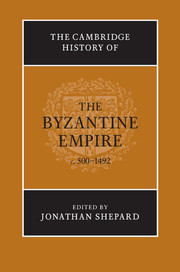Book contents
- Frontmatter
- General Introduction
- Part I The Earlier Empire c. 500–c. 700
- Part II The Middle Empire c. 700–1204
- Part III The Byzantine Lands in the Later Middle Ages 1204–1492
- 20 After the Fourth Crusade
- 21 Balkan Powers: Albania, Serbia and Bulgaria (1200–1300)
- 22 The Palaiologoi and the World Around Them (1261–1400)
- 23 Latins in the Aegean and the Balkans (1300–1400)
- 24 The Roman Orthodox World (1393–1492)
- Glossary (Including some Proper Names)
- Genealogical Tables and Lists of Rulers
- List of alternative place names
- Bibliography
- Picture Acknowledgements
- Index
- References
23 - Latins in the Aegean and the Balkans (1300–1400)
from Part III - The Byzantine Lands in the Later Middle Ages 1204–1492
Published online by Cambridge University Press: 28 March 2010
- Frontmatter
- General Introduction
- Part I The Earlier Empire c. 500–c. 700
- Part II The Middle Empire c. 700–1204
- Part III The Byzantine Lands in the Later Middle Ages 1204–1492
- 20 After the Fourth Crusade
- 21 Balkan Powers: Albania, Serbia and Bulgaria (1200–1300)
- 22 The Palaiologoi and the World Around Them (1261–1400)
- 23 Latins in the Aegean and the Balkans (1300–1400)
- 24 The Roman Orthodox World (1393–1492)
- Glossary (Including some Proper Names)
- Genealogical Tables and Lists of Rulers
- List of alternative place names
- Bibliography
- Picture Acknowledgements
- Index
- References
Summary
By the beginning of the fourteenth century, the Byzantine reconquest of 1261 had made its mark on Latin expansion in the Aegean and the Balkans. With the treaty of Nymphaion on 13 March 1261, Michael VIII Palaiologos (1258–82) granted the Genoese access to the Black Sea. Similar access was granted to the Venetians in the years that followed, and their principal conquests since the Fourth Crusade were recognised. A chain of trading posts and ports of call thus stretched along the main sea routes and was dominated by the Italian maritime republics; Andronikos II Palaiologos (1282–1328) had abandoned the maintenance of a Byzantine fleet as too costly (see above, p. 810). At the heart of this nexus of great trade routes, leading from Italy to Constantinople and the Black Sea, Cyprus and Lesser Armenia, Syria and Alexandria, was the Aegean. Control of its coasts and islands became a vital necessity for the Italian maritime republics and the object of frantic competition; from this sprang the three ‘colonial’ wars between Genoa and Venice in the course of the fourteenth century. Their only result was a de facto carve-up of the Aegean: Venice had the western and southern coastline, with Messenia, Crete and Negroponte, Genoa the eastern coasts with Chios, Lesbos and the islands of the northern Aegean, while the Catalans would disrupt this Italian maritime and commercial hegemony through their seizure of the duchy of Athens and rapid development of piracy.
- Type
- Chapter
- Information
- The Cambridge History of the Byzantine Empire c.500–1492 , pp. 834 - 851Publisher: Cambridge University PressPrint publication year: 2009



